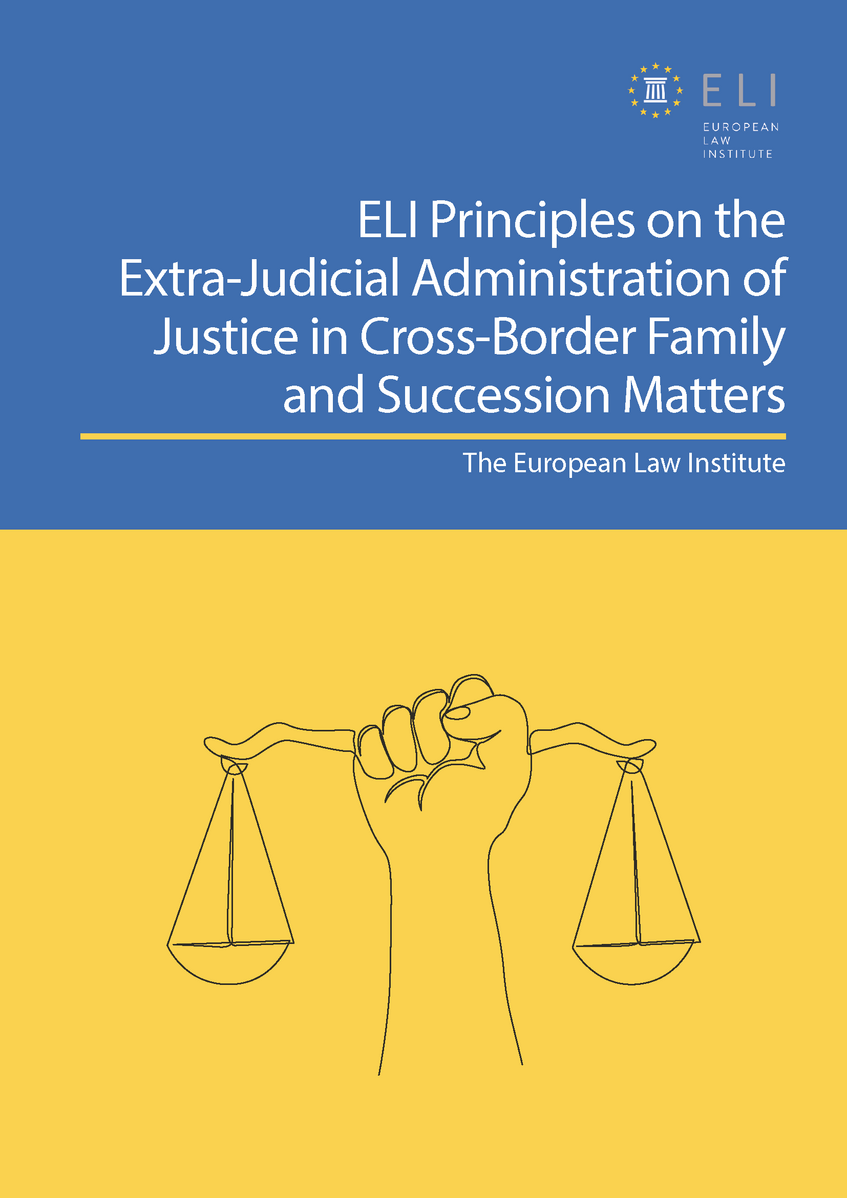Extra-Judicial Administration of Justice in Cross-Border Family and Succession Matters
Quick Facts
Project Type: Principles
Procedure: Regular
Adopted: CD 2020/24
Project Period: September 2020–April 2025
- Further information is available here
Events
An overview of past and upcoming events of this project is available here.
Background
The concept and the role of courts in family and succession matters presents a practical problem in the EU and its Member States. Most EU private international law instruments presuppose that justice in the area of family and succession law is still mainly administrated by courts. However, it is a current trend in the Member States to shift competences in family and succession matters from courts to other authorities such as notaries, civil status officers, child protection agencies, judicial officers, advocates or even the private parties themselves. Are the common provisions on jurisdiction, applicable law and recognition and enforcement of foreign judgments fit to deal with this ‘de-judicialisation’? Recent case law of the Court of Justice of the European Union (CJEU) suggests that there is need for reform.
The project was divided into two phases. First, a preliminary study was conducted, in order to identify the current controversial issues on the basis of the recent case law of the CJEU. The main objective of this phase was to produce a short policy statement.
The second step required an in-depth comparative analysis in order to identify existing out-of-court proceedings and non-judicial bodies in family and succession law at a national level. This analysis was needed in order to both develop a harmonised concept of court in family and succession matters and adjust existing European instruments to the increasing de-judicialisation. The main objectives of this phase were to identify and circulate critical issues and best practices, in order to encourage national legislators to implement substantive and procedural standards, to ensure a uniform application of EU instruments,; and to elaborate a Draft legislative proposal aiming at the amendment of current instruments (Brussels IIb Regulation, the Maintenance Regulation, the Hague Maintenance Protocol, the Rome III Regulation, the Succession Regulation and the Matrimonial Property Regulation for spouses and the Property Regulation for registered partners).
The project was financed by an action grant under the Justice Programme of the European Union and conducted in cooperation between the European Law Institute (ELI), the University of Pisa and the Ludwig-Maximilians-University Munich. Further information on the project can be found here.
Aim
The Extra-Judicial Administration of Justice in Cross-Border Family and Succession Matters aimed to develop an outline for a harmonised European concept of courts, including ia notaries and other actors traditionally not qualified as courts, building on the approach of the CJEU in its recent case law, to ensure a harmonised application of EU instruments in the Member States by detecting and developing best practices and minimum standards to be fulfilled.
Outcome
The seven Principles are based on a comprehensive comparative analysis of national legal frameworks and practices. The research mapped out the various non-judicial bodies involved in family and succession matters across the EU and identified both the legal uncertainties and the innovations that have emerged from this trend. The core aim of the recommendations is to ensure that extra-judicial procedures in family and succession matters are applied in a coherent, rights-respecting, and effective manner in cross-border cases. Formulated as Principles, the recommendations offer a roadmap for updating EU private international law to reflect contemporary legal realities while upholding the Union’s core values.
Project Reporters
Advisory Committee Members
- Frédérique Ferrand
- José-Maria Gomez-Riesco Tabernero de Paz
- Tobias Helms
- Costanza Honorati
- Matthias Neumayr (Assessor)
- Pascal Pichonnaz (Assessor)
- Walter Pintens
- Ilaria Pretelli (Assessor)
- Jens Martin Scherpe (Assessor, until March 2024)
- Andrea Schulz
- Maciej Szpunar
- Camelia Toader
- Ilaria Viarengo
Members Consultative Committee
Association of Notaries of the Republic of Poland (represented by Wiktor Karpowicz)
- Marina Androulaki
Arvind Babajee
- Joaquín Bayo Delgado
- Yurii Bilousov
- Mircea Bob-Bocsan
- Robert Bray
- Tomasz Chmielewski
- Gregor Christandl
- CORPME (represented by Marta Hernández)
- Olga Cvejić Jančić
- Elena D'Alessandro
- Irina Dikovska
- Giulia Donadio
- Christiana Fountoulakis (Chair)
- Cristina González Beilfuss
- Lukas Heckendorn Urscheler
- Francisco Javier Jiménez Muñoz
- Jens Kleinschmidt
- Thalia Kruger
- Antonio Legerén Molina
- Elena Marinică
- Giuseppe Marino
- Lineke Minkjan
- Daniele Muritano
- Jose Pau
- Natalia Rueda
- Carlo Rusconi
- Sharon Shakargy
- Stacie Stong
- Irina Zlatescu
Country Reporters
- Stéphane Berre
- Katažyna Bogdzevič
- Nicola Chiricallo
- Nataša Erjavec
- Laura Esteve Alguacil
- Aron Johanson
- Merel Jonker
- Katarzyna Kamińska
- Tiina Mikk
- Kathryn O’Sullivan
- Paul Patreider
- Rute Teixeira Pedro
- Frank Høgholm Pedersen
- Wendy Schrama
- Elisa Stracqualursi
- Lars Thøgersen
- Laima Vaigė
- Ioan Luca Vlad
- Eleni Zervogianni

